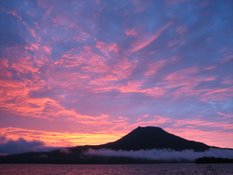I received an email from my alma mater, Principia College, asking me how my World Perspectives major affected me. A lot of what I wrote is good background for why I am a language teacher today and why I am presently in Japan. I'm posting my comments here in case you're interested.
So, how has being a Global Perspectives major affected...
you?
Skills that I developed as a result of the required courses for World Perspectives:
* I am a more conscious global citizen because of the weekly geography exercises and tests that we did in world focus seminar (W Pers 270).
* I am a savvy reader of the CS Monitor from the 10 international articles a week that I read for 5 quarters for world focus seminar.
* I never take a book's message at face value, but I research the background of the author, the bias of his/her perspective on the subject, and all contextual information about the book before making a conclusion. This skill was developed from reading a multi-100 page book a week and writing a paper on it for Worldography (W Pers 431).
* Accessing primary source material from sources around the world to write my capstone project (W Pers 401).
* Synthesizing information from different disciplines to capture a more global perspective [now I see why there's the name change!] of an issue
How it affected me as a person? That's a little bit harder to say 7 years out of graduation. But I've been a lot of places since then, so I guess you could say that World/Global Perspectives launched my international career.
the way you see the world?
It expanded my thought beyond the cliffs of Principia, beyond national borders, to investigate strands of humanity that unite us. I am capable of evaluating the information sources that I am pummeled with everyday to form my own conclusion. I can listen to conservative AM talk radio and watch Fahrenheit 9/11 in the same day and feel more informed for having explored two perspectives instead of seeing any source (besides God) as all-knowing and absolute truth!
I see a lot of value in cross-cultural communication. I want to immerse myself in world cultures for months, if not years, at a time in order to understand them beyond their surface features of art, fashion, and language. I want to understand what they value in life, their perspective, on the same things that I deal with in a different way.
the way you approach learning?
World Perspectives hands down prepared me for the demands of graduate school. My MA is in Teaching English to Speakers of Other Languages (TESOL), a combination of applied linguistics and education studies. I didn't have much of either at Prin, but I did have the writing and project coordination skills that were developed by writing the 70+ page Capstone project. And of course GP, and Prin moreover, has inspired a desire for life-long learning.
I have learned 6 languages that I speak with at least intermediate ability: English, Jamaican Creole, Spanish, French, Russian, and Japanese. I don't see language acquisition as limited by age or vocabulary size. This is thanks to MK Morgan who said, "education is not the accumulation of facts but the unfoldment of ideas."
what did you appreciate about the interdisciplinary nature of the major?
My interests were so varied at Prin that I needed the flexibility of the Global Perspectives major to legitimize my broad studies. People are always fascinated when I tell them I was a WP & Russian Studies major with a minor in Biology. "Was there anything you didn't study" they ask me. Not much! When you take such a breadth of courses in an intense time like the quarter system, I think you learn how to learn in addition to the specific subject.
In the field of language education, one of the recent trends in content-based instruction (CBI). CBI is where a subject like geography, psychology, physics, etc is taught through the medium of the target language. Where the focus isn't on the grammar or language forms but on understanding and communicating the content of the subject. So an English speaker would study geography in French with a teacher who is competent in both langauge instruction and geography. I felt drawn to this area because of the interdisciplinarity of my Global Perspectives major
Most especially-- what are you doing these days?
I'm far away from the "water resource conflicts of transnational river basins" that was my capstone topic. I am teaching English as a foreign language at a private, Christian all-boys Junior High school between Kobe and Osaka in Japan.
Right after Prin, I joined the Peace Corps first in Benin, West Africa then in Jamaica, West Indies. I taught environmental education in rural schools. It seems like the more I travel and work abroad, the more I discover that I really didn't have to leave my own country to address global issues. The infant mortality rate of Jamaica was equal to that of the Mississippi Delta. California's policy on English education is based on a silicon valley engineer's opinion instead of sound research. These sorts of injustices need ground workers who can grasp the facts and be a fair advocate for policy change. In September I'll be moving to back California to teach ESL in an urban school.
what are your aspirations, dreams goals?
I'd like to start a summer camp for English language learners in the USA to learn leadership and peacebuilding skills. I'd like to contribute to global communication by training language teachers all over the world how to create effective and interesting lessons.
Thanks for a great trip down Memory Lane, Bonnie and Andrea. Good luck!
5.10.2006
Subscribe to:
Post Comments (Atom)
Countries I have visited
Where I've been in the USA
visited 44 states (88%)
Create your own visited map of The United States or Like this? try: Canned laughter





No comments:
Post a Comment